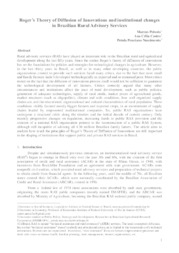Roger's theory of diffusion of innovations and institutional changes in Brazilian rural advisory services.
Roger's theory of diffusion of innovations and institutional changes in Brazilian rural advisory services.
Author(s): PEIXOTO, M.; CASTRO, A. C.; NASCIMENTO, P. P.
Summary: Rural advisory services (RAS) have played an important role in the Brazilian rural and agricultural development along the last fifty years. Since the sixties Roger?s theory of diffusion of innovations has set the foundations for policies and strategies for technological changes in agriculture. However, in the last thirty years in Brazil, as well as in many other developing countries, the public organizations created to provide such services faced many critics, due to the fact that most small and family farmers hadn?t developed technologically as expected and so remained poor. Most critics rested on the fact that the diffusion of innovations process itself would not be sufficient to guarantee the technological development of all farmers. Critics correctly argued that many other circumstances and institutions affect the pace of rural development, such as public policies, generation of adequate technologies, supply of rural credit, market prices of agricultural goods, market structures (such as oligopolies), climate and soils conditions, how well organized supply chains are, and the educational, organizational and cultural characteristics of rural population. These conditions visibly favored mostly bigger farmers and exported crops, in an environment of supply chains leaded by empowered multinational companies. So, public RAS organizations have undergone a structural crisis along the nineties and the initial decade of current century. Only recently progressive changes on regulation, increasing funds to public RAS provision and the creation of a national RAS organization pointed to the reconstruction of a public RAS System, although still incapable of advising all 4.36 million Brazilian family famers. The article aims to analyze how much the principles of Roger?s Theory of Diffusion of Innovations are still important in the shaping of institutions that support public and private RAS services in Brazil
Publication year: 2015
Types of publication: Paper in annals and proceedings
Keywords: ATER, Diffusion, Innovation, Rural advisory services (RAS), Rural development
Observation
Some of Embrapa's publications are published as ePub files. To read them, use or download one of the following free software options to your computer or mobile device. Android: Google Play Books; IOS: iBooks; Windows and Linux: Calibre.
Access other publications
Access the Agricultural Research Database (BDPA) to consult Embrapa's full library collection and records.
Visit Embrapa Bookstore to purchase books and other publications sold by Embrapa.

